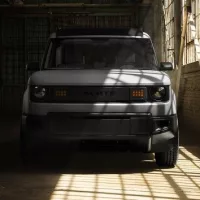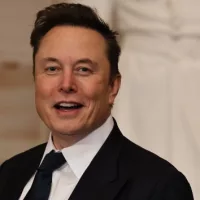
Morgan Korn/ABC NewsBY: MORGAN KORN, ABC NEWS
(NEW YORK) — It’s the dilemma every automaker is frantically trying to solve: Convincing Americans to give up gas-powered cars for electric vehicles.
The barriers are diverse. There’s range anxiety. A lack of nationwide chargers. Steep prices. A general bewilderedness of what an electric vehicle is and how it works.
Tesla, of course, has dominated the burgeoning electric vehicle market since its curvy, high-tech Model S sedan launched in June 2012.
Even with the introduction of EVs from European and from mainstream brands — General Motors, Nissan, Audi, Jaguar, Audi, Hyundai — Tesla continues to outsell the competition. In fact, four of the five bestselling EVs in the U.S. are Teslas.
“Tesla is clearly the most successful EV company — ever,” Karl Brauer, executive publisher of the website CarExpert, told ABC News.
Teslas are not inexpensive. The rear-wheel drive base Model 3 starts at $36,990. The Model S in “Plaid+” trim — Tesla’s most powerful model with an alarmingly fast 0-60 mph time of 1.99 seconds — sets buyers back at least $134,490. Tesla showed consumers are “willing to pay up” for EVs, noted Brauer.
Many automakers, however, are deciding to build snappy EVs that offer solid range at attractive prices — a strategy that could pump up sales and market share — of EVs this year. The average transaction price of an EV in 2020 was $54,206 vs. an industry average of $39,251 — an increase of 38.1%, according to Edmunds.
Take GM for example. The redesigned 2022 Chevrolet Bolt EV, available this summer, has an MSRP of $31,995 — a saving of more than $5,000 from the 2021 model. The compact EV gets an estimated 259 miles on a full charge. Both the Bolt EV and the all-new Bolt EUV, similar in design to the EV but slightly larger and more SUV-like with an estimated range of 250 miles, are fitted with 65 kilowatt-hour, lithium-ion battery packs. The single-motor drive unit in the Bolts deliver a peppy 200 horsepower and 266 lb.-ft. of torque — plenty fine for daily drives and routine errands.
GM is so committed to its electrified future (30 new EVs globally by 2035) that the company will cover standard installation of Level 2 charging capability for customers who purchase or lease a 2022 Bolt EUV or Bolt EV.
“We want customers for life,” Jesse Ortega, architectural chief engineer of the Chevrolet Bolt, told reporters in February. “We have a golden opportunity here. EVs are now more attainable to a whole lot more customers with the lower price point.”
The most affordable EV on the market currently belongs to British marque MINI Cooper. The quirky automaker unveiled its hardtop two-door SE last March. Roughly 1,200 units of the $29,995 hatchback have been sold in the U.S. and more than 80% of SE buyers are new to the brand, according to Andrew Cutler, a MINI spokesperson.
What the SE lacks in range — an estimated 110 miles — it makes up for in retro styling and performance, with go-kart handling, instant torque and smooth acceleration. Cutler pointed out that a majority of Americans commute an average of 40 miles round-trip per day, well below the SE’s industry-maligned range.
“You plug-in at night, unplug in the morning and drive all day,” he said. “The SE is a fun, electric escape pod.”
Volkswagen’s battery-powered ID.4 goes for the jugular of non-electric rivals like the Toyota RAV4 and the Honda CR-V. The rear electric motor in the ID.4 ($39,995 for the entry-level Pro model and $43,995 for the 1st Edition, which, according to VW, is completely sold out) puts out 201 hp and 229 lb.-ft. of torque and the 82kWh battery allows the sporty EV to travel 250 miles between charges.
The ride style depends on the owner. Newbies to one-pedal driving will likely prefer the default mode, which allows the ID.4 to coast whenever the driver’s foot is off the accelerator or brake pedal, mimicking how a traditional internal combustion engine operates. Either way, VW promises its first all-electric SUV and the brand’s first global EV will be an engaging experience. Plus, the Volkswagen ID.4 comes with three years of unlimited public DC fast charging on the Electrify America network — a move by VW to win over more customers.
“We are at a tipping point with EVs,” Dustin Krause, Volkswagen’s director of e-mobility, told ABC News. “Curiosity is strong for the ID.4. This is an opportunity for people to get reacquainted with the brand.”
Ivan Drury, a senior manager at Edmunds, said an EV’s range may actually be more important than price for consumers debating whether to join the electric car revolution.
“Higher ranger is definitely helping to persuade people to give up their ICE vehicles,” he told ABC News. “Range is so critical and it’s increasing every model year — 250 to 300 miles is the sweet spot.”
Drury noted that owners of gas, diesel, hybrid and plug-in hybrid vehicles put more miles on the odometer than EV buyers. If range anxiety fades away, EVs can go from being an “experiment” to a daily conveyance, he said.
Electrics will grow on Americans when a large selection of battery-powered trucks and SUVs are available, according to Brauer. He does like the $37,390 Hyundai all-electric KONA SUV, which offers 258 miles of range and is eligible for the $7,500 federal tax credit — along with most EVs, except Bolts and Teslas.
“Fear and apprehension are keeping a lot of people from buying EVs,” Brauer said, adding, “Tesla has created an EV following that’s not based on natural consumer behavior. It’s based on a personality, a cult.”
Brauer and Drury agree that Ford’s trumpeted Mustang Mach-E — starting price $42,895 — may be the EV that truly woos undecided motorists and helps end the nation’s fascination with giant gas-guzzlers. The slinky SUV boasts an estimated range of up to 300 miles and the more pricey GT version posts a 0-60 mph sprint of 3.8 seconds, faster than some conventional Mustangs on the road today.
“Ford has taken a product every American is fully aware of — the Mustang — and has done something controversial,” Drury said. “Can it convert Tesla owners to becoming Ford owners? That would be a paradigm shift.”
According to Darren Palmer, global director of battery electric vehicles at Ford, the sexy SUV has already persuaded existing EV owners to swap their vehicles for the Mach-E and 65% of people who put deposits down were Ford neophytes. Like VW, Ford is sweetening the deal for new owners of a Mach-E, giving 250 kilowatt hours of free charging through FordPass Rewards at Electrify America fast-charging stations. The Dearborn automaker expects global sales of the Mach-E to reach 50,000 units in its first 12 months of production.
“Americans are not quite ready for EVs,” Palmer told ABC News. “This vehicle shows them what’s possible.
Copyright © 2021, ABC Audio. All rights reserved.














